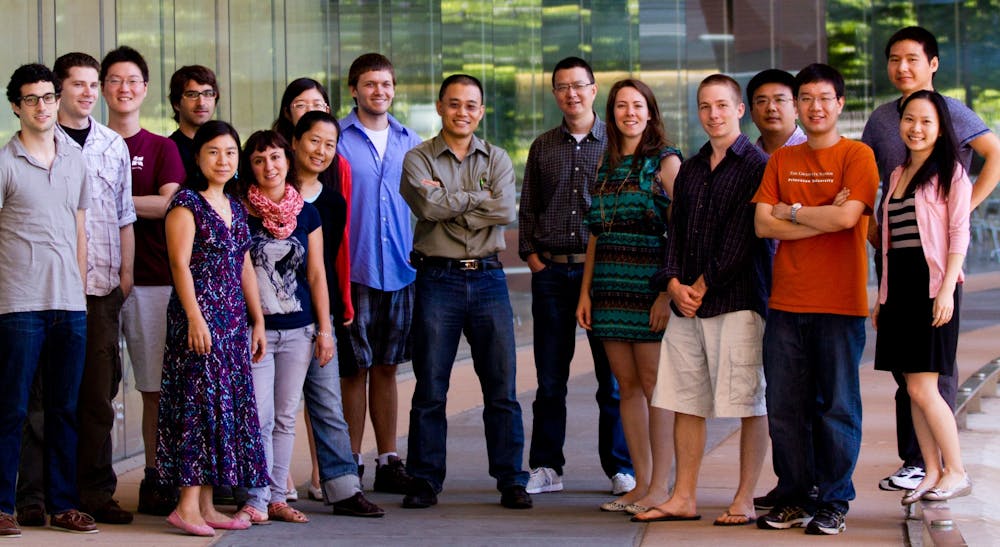A lab led by molecular biology professor Yibin Kang reported the discovery of a new organelle involved in cancer metastasis — the late-stage spread of cancer tumors throughout the body — early this month in Nature Cell Biology.
The organelle, which remains unnamed, forms when multiple liquid blobs containing proteins and RNA molecules combine to form one liquid droplet. This phenomenon is referred to as liquid-liquid phase separation and remains an active area of research in the field of molecular biology.
This phenomenon has been previously modeled in other laboratory settings, where a component was pressed against a set of glass slides, leading to its separation into distinct droplets. Kang’s lab was able to identify cancer cells using this process to form the organelle in vivo — that is, in a living system.
According to Kang, the discovery is significant for cancer research.
“This is the first time that biomolecular condensation is shown to be involved in cancer metastasis,” Kang wrote in an email to The Daily Princetonian.
Through a series of experiments, Kang’s lab was able to determine the organelle’s role in the spread of cancer via its link to a relatively uncharacterized gene known as DACT1 and the famous Wnt signaling pathway, which regulates important pathways such as those in cell migration, cell polarity, and the formation of organs during embryonic development. The Wnt pathway was discovered by molecular biology professor Eric Wieschaus.
The DACT1 gene encodes a protein of the same name which, researchers discovered, serves as a key player in the mechanism by which liquid-liquid phase separation contributes to cancer metastasis.
In this cancer pathway, a term used to denote how cancer forms and spreads, initial tumor formation in the bones causes a series of events that result in DACT1 proteins guiding cellular materials essential to the Wnt signaling pathway into the newly discovered organelle, thereby contributing to its formation. The build-up of these materials in the organelle suppresses the Wnt pathway, a step that has been shown to drive metastasis into more advanced stages.
Kang believes that characterizing the stages of the pathway through which DACT1 drives metastasis may be an essential step in better understanding cancer spread overall.
“By understanding how DACT1 drives the formation of such biomolecular condensates, or ‘organelles,’ we may come up with new ways to prevent or [treat] metastatic cancers,” he wrote in his email.
Mark Esposito, a current postdoctoral candidate in the Kang lab and 2017 Ph.D. alumnus, is the primary author of the paper. Identifying the protein encoded by DACT1 inspired a slight change in his original research plans, which eventually led to the discovery.
“I was initially looking for new factors that drive the spread of late-stage cancer, known as cancer metastasis,” Esposito wrote in an email to the ‘Prince.’ “When I found that this new protein had such unique biological properties, the focus changed from a translational study into one that had a strong basic science focus.”

At the heart of Kang’s research philosophy is the goal to better understand the science behind cancer formation itself.
“Cancer metastasis is responsible for a large majority of cancer-related death, and most metastatic cancers are terminal, with no available cure,” he wrote in his email.
“I believe that, by understanding the biology of metastasis better, we can develop more effective drugs to reduce the suffering and death from cancer,” he continued.
The research is a culmination of collaborations between University laboratories, which Kang highlighted in his email, writing, “this is a productive and multidisciplinary collaboration between my lab and Prof. Cristea and Brangwynne’s labs.”
Ileana Cristea is a professor of molecular biology whose research focuses on virology and proteomics. She is a leading expert in mass spectrometry. Clifford Brangwynne is a Professor of Chemical and Biological Engineering and Director of the Princeton Bioengineering Initiative, whose research led the study of biological phase transitions.
Esposito echoed Kang’s sentiments emphasizing the importance of collaboration on the project.
“This research was only possible with the close research community at Princeton; the collaborations formed during this project spanned three distinct research areas,” he wrote.
“That close collaboration is one of the strongest assets of Princeton’s research engine,” he added.
Understanding cancer spread and the potential therapies that can come from these investigations remains at the center of Kang and Esposito’s research goals. The pair co-founded Kayo-Thera, a company focused on developing medications for late-stage or metastatic cancers, based on their scientific findings.
Kang hopes to further investigate the organelle’s role in both healthy and cancer cells and investigate the DACT1 pathway as a potential source for cancer therapies.
“The condensates form in both normal cells and cancer cells. We are interested in knowing what they normally do in healthy cells and how they are misused by cancer cells and enhance their metastatic behavior,” he wrote in an email to the ‘Prince.’
“We also want to find ways to block DACT1 in cancer cells as a way to reduce bone metastasis development,” he added.
Esposito says he is also looking forward to furthering his research on potential therapies and is now directing his focus on a new nutrient pathway, which has links to controlling cancer spread.
He wrote, “I’m currently investigating a misunderstood nutrient pathway that has a major impact on people’s immune systems and how that immunity helps to control cancer’s growth.”
“I’m developing a new cancer therapy with the goal of treating difficult cancers for which there are no other therapeutic options,” he added.
The Kang lab has published its investigations in renowned science journals, including Cell, Cancer Cell, Nature Medicine, and Nature Cell Biology.








